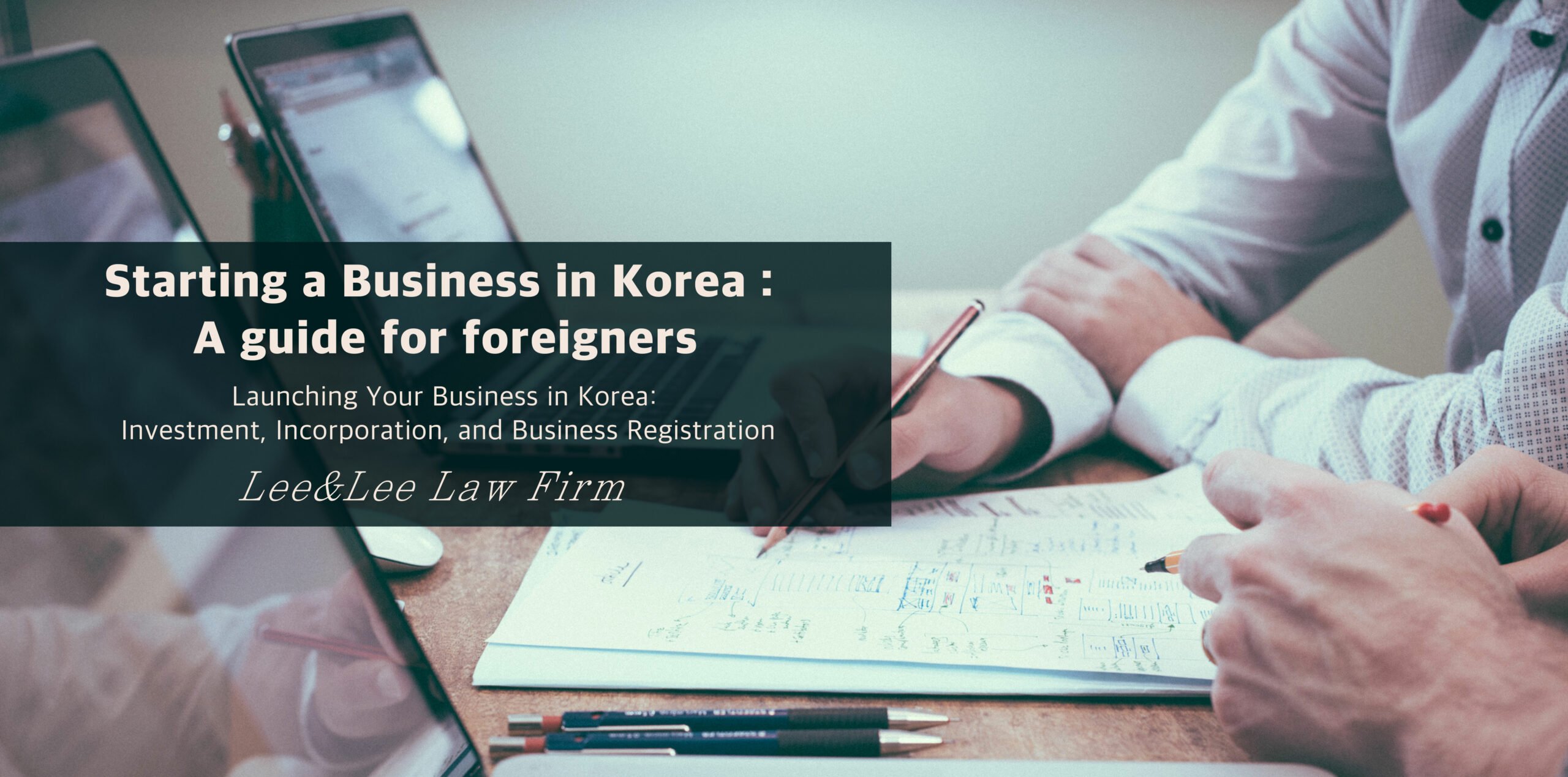Launching Your Business in Korea: Investment, Incorporation, and Business Registration
Table of Contents
- Launching Your Business in Korea: Investment, Incorporation, and Business Registration
- How to setup a business in Korea as a foreigner
- The process of Business setup
- Forms of business setup in Korea
- Incorporation in Korea and Types of Corporations
- Foreign direct investment /FDI Company
- Business Registration/ Business License, and related licenses

Thinking of starting your own business in Korea? Dive into our guide that makes the intricate process of setting up a business in Korea, as a foreigner, more manageable and less daunting.
How to setup a business in Korea as a foreigner
If a foreigner is not a resident of South Korea, or if your company is a foreign business entity, here’s the guide to how to set up the business in Korea. We provide the 1stop service from the beginning of the forming business entities to the completion of the setup, accounting services after, plus immigration issues.
The process of Business setup
- Reporting/Notifying a foreign direct investment
- Remittance of investment
- Incorporation
- Business Registration
- Obtaining additional licenses in need
- Opening a business bank account
- Transferring funds Registering a foreign direct investment company (FDI company)
- Applying for a visa.
Some procedures may be skipped or unnecessary depending on what form of business you are setting up in Korea. You can consult with our Investment, Business lawyer.
Forms of business setup in Korea
- Incorporation: Korean corporation
A foreigner who’s not a resident of Korea can incorporate a new Korean company with an investment of more than 100 million KRW equivalency of foreign currency. By doing so, you can establish a local corporation in Korea.
- Branch office
A foreign company can establish a branch office in Korea whose headquarters are overseas. Branch offices are allowed to do activities for making a profit in Korea. Business registration and license are required for doing such activities. The major difference between having a local corporation and a Korean branch office is the requirement of the minimum investment amount, legal liability, tax benefits, etc. (See the article)
- Liaison office
The Liaison office is not considered a business entity, a foreign company can establish it for non-sales activities, such as research, development, after-sale services, etc. Since the Liaison office doesn’t do sales activities, business registration or license is not issued.
Incorporation in Korea and Types of Corporations
Other than some foreign direct investment-related steps, the procedures of incorporation are applied to foreigners basically the same as to Koreans. Normally incorporation itself takes about 1-2 weeks. Incorporation is a court process, and it takes about 1 week.
Types of Korean corporations a foreigner can establish.
In Korea, we have 5 different legal forms of companies: Stock company, Limited company, Limited Liability Company, Limited Partnership Company, and Partnership company.
The most common type of corporation is a Stock company or a Joint one. The major differences between a Stock company and a Limited company are Transfer of capital, Issuance of bonds, Board of directors, Number of directors requirement, Number of auditors, etc.
There is no minimum investment amount requirement for both, if it’s not planned to register as FDI company.
Foreign direct investment /FDI Company
What is FDI?
In general, FDI means 100 million KRW or more investment made by foreigners. FDI company refers to a company at least 10% or more of the voting stocks issued to a foreign investor and at least 10% of the total investment amount should be made by foreign investors. If neither of the requirements is satisfied, the appointment of an executive member who holds voting rights in major decision-making, etc. of the company is needed.
Types of FDI
There is the acquisition of stocks of domestic companies, 5 years or more of long-term loans from mother companies overseas, and investments in non-profit corporations in science and technology. Objects of investment to acquire shares, foreign currency, capital, goods, industrial property rights, etc.
FDI process
The FDI process is a part of the Business setup in Korea. Notification of foreign direct investment to the Foreign Exchange Bank of Korea is required. The bank will issue an FDI account to receive funds if it’s for a newly created local company. And after incorporation and business registration are finished, funds arrived in the FDI account into a new company’s bank account. Registration of the FDI company can be done within 1-3 days in the bank where the company’s account is.
Why Foreign direct investment
Korean government promotes foreign investment, governing FDI companies through Foreign Investment Promotion Act, Special Taxation Act, providing tax benefits, etc.
Business Registration/ Business License, and related licenses
When a foreigner created a new business entity in Korea, it should be registered with the tax office. If it’s a corporation, it can be done after the incorporation process in court.
Opening a bank account
With the business registration certificate, a foreigner can open an account for a business. If it’s a new local company, the invested funds shall be transferred to a new company’s account as capital money.
Foreign investment in South Korea and visa
A person who desires to engage in the administrative management of a foreign investment company prescribed by the “Foreign Investment Promotion Act” can be eligible for a D-8 visa. A foreigner who properly reports the FDI notification and meets the requirement of being recognized as a person who made an FDI can apply. D8 is a long-term visa, also known as a Korean entrepreneur visa, or Investor visa, which grants permanent resident status(F5 visa) after 5 years of holding.
Business setup and hiring a lawyer in Korea
Our lawyers provide a one-stop service for businesses set up in Korea. Since it has many concerning steps, we highly recommend you get a lawyer. Our services are not limited to a few or part of the steps of business formation, such as company incorporation or business registration. We are involved in all aspects of setting up a business in Korea, including obtaining additional permits to properly conduct your business, finding, and managing office leases, obtaining visas for staff, etc. Especially when you’re overseas, setting up your business in Korea will be much more accessible and easier when you have attorneys to handle it on your behalf.
A page related to business in Korea:
A site related to business in Korea:
Korea Trade-Investment Promotion Agency (KOTRA)
Invest Korea
Ministry of Trade, Industry, and Energy (MOTIE)
Q1: What is the first step for a foreigner to start a business in Korea?
A1: It depends on whether you’re a resident or not in Korea. In most cases, the first step is reporting or notifying a foreign direct investment to the Korean authorities.
Q2: What are the different forms of business setup in Korea?
A2: Basically, a Private business or Corporate. If you’re a non-resident foreigner in Korea, a private business is not an option. Foreigners as a individual or as a foreign company can establish a Korean corporation, a branch office, or a liaison office in Korea.
Q3: What is a Foreign Direct Investment (FDI) company?
A3: An FDI company refers to a company with at least 10% or more of the voting stocks issued to a foreign investor and at least 10% of the total investment amount made by foreign investors.
Q4: What is the D-8 visa?
A4: The D-8 visa is a long-term visa for foreigners engaged in the administrative management of a foreign investment company(FDI) in Korea.
Q5: Why is hiring a local lawyer in Korea important for a foreign business?
A5: A local lawyer can provide comprehensive services for business setup, including company incorporation, business registration, obtaining additional permits, managing office leases, and obtaining visas for staff.
Q6: What are the types of corporations a foreigner can establish in Korea?
A6: In Korea, foreigners can establish a Stock company, Limited company, Limited Liability Company, Limited Partnership Company, or a Partnership company.
Q7: How is the FDI process linked to business setup in Korea?
A7: The FDI process involves notifying the Foreign Exchange Bank of Korea, opening an FDI account, remitting investment funds, incorporation, business registration, and finally transferring the funds to the new company’s bank account.
Lee & Lee law office’s english speaking lawyers provide clients with the highest quality representation
SEOUL, Gangnam Office (Korea) | Kristen Y. LEE
2F, 27-6, 162 Gangnam-daero, Gangnam-gu, Seoul, Republic of Korea

